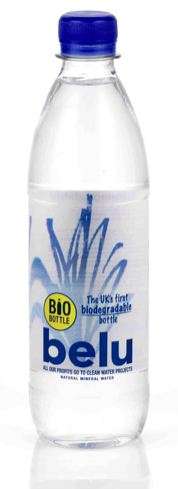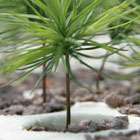Belu Natural Mineral Water last week launched the UK's first biodegradable and compostable plastic bottle. The revolutionary plastic bottle is made from corn instead of petroleum oil and can be commercially composted back into soil in 80 days.
"This can dramatically reduce the amount of rubbish going into landfills and gives everyone an easy way to help protect the environment," said Mai Simonsen, one of the founding members of Belu.
The "Bio-bottle" is the latest good news from London-based Belu, a bottled water maker that contributes 100 percent of its net profits to clean water projects. Working with WaterAid, every bottle of water purchased in the UK provides someone in India or Africa with clean water for one month.
Belu was formed in response to a challenge by the UN's Global Compact, for the business community to help solve global problems. . . A group of friends, environmentalists and companies interested in making a positive difference took up the challenge, including Gordon Roddick, John Bird, Ben Goldsmith, ?What If! Innovations, Clifford Chance and Lewis Moberly Design. The bio-bottle, made by NatureWorks® PLA and Planet Friendly Products, was a natural next step for Belu.
BIOTA Spring water of Colorado pioneered the use of the corn-based bottles, created by NatureWorks® PLA, with their very first shipment of BIOTA water back in February 2004 to Wild Oats foods. BIOTA bottled water is now widely found in Chicago, Central Florida and the Western U.S. as well as health and whole food stores nationwide.
The bottle looks and feels just like traditional plastic and BIOTA founder David Zutler says it will not begin to break down unless it is emptied and placed in a particular environment surrounded by constant heat, humidity and micro-oganisms.
Environmentalists disagree on the merits of the Bio bottle. They regret today's throw-away society and believe bio bottles just encourage that trend. But Zutler counters that recycling isn't working like it should. "Of 120 billion plastic bottles produced last year, 95 billion ended up in landfills and will never biodegrade."
And his arguments are bolstered by a Western world that wants less dependence on oil. "For every three-and-a-half cases of BIOTA purchased, you can save one gallon of oil," Zutler said. "One hundred and fifty cases represents saving a barrel of oil."
The Belu Bio bottles will be available in selected Waitrose stores and in most of the major UK supermarkets in the coming months.
For more information visit www.belu.org or www.biotaspringwater.com
Editor's note: Our faucets are supplied with well water so we reuse water bottles over and over, simply filling them with the good stuff from the tap. We have probably up to 20 bottles on our counter at any given time. I know we're lucky to be able to lessen our footprint on the planet. . . What do you think, should every bottler in the world switch to corn bottles or should we stress reuse and recycling in a more urgent way?










Be the first to comment